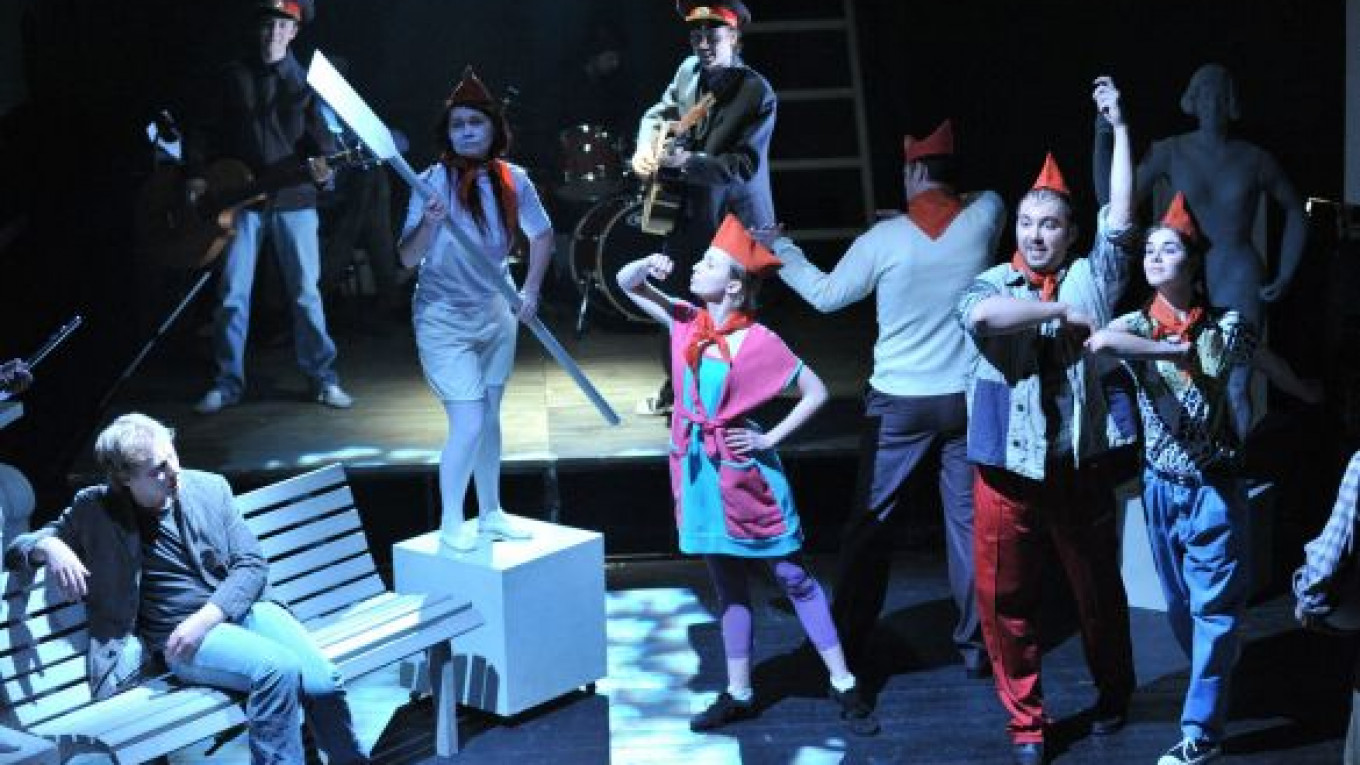Boris Ryzhy was a poet who, had a few things happened differently, could have disappeared without a trace. When he committed suicide in 2001 several months short of his 27th birthday, he had published just one slim book drawn from a total of about 1,300 poems, only a quarter of which had been published in journals.
But even that small output attracted serious attention. A live appearance he made in Holland made him something of a star in that country, and in Russia in 2000 he won an honorable mention from the jury of the Anti-Booker prize.
A poet of the stature of Yevgeny Rein now can declare Ryzhy “the most talented poet of his generation.”
At the Fomenko Studio, actor and director Yury Butorin mounted a production that aims to interpret the poet’s themes and works in a theatrical setting.
Not surprising, considering both the organic connections of poetry and music and Ryzhy’s own frequent reference to music in his work, Butorin leaned heavily on music to make his case.
By my tastes it is the music that makes this production hard to stay with at times.
Sergei Nikitin, a composer of popular music and film scores in the 1970s and 1980s, provided the bulk of the tunes balancing precariously between the territories of easy listening and outright cliche. Also tossed in for good measure are several melodies written by cast members, as well as some familiar Western pop tunes from the 1980s and 1990s.
Nikitin’s jaunty, saccharine melodies strike me as being diametrically opposed to the spirit of Ryzhy’s poetry.
More to the point would have been a composer in the vein of Viktor Tsoi, whose name is scribbled in graffiti on one of the grungy city walls of the set created by Vladimir Maximov.
But in place of a slashing rock band, the music in “Ryzhy” is performed by an on-stage group whose tentative forays into the territory of blues and jazz are unnervingly flat.
Ryzhy was a gritty writer, never flat, who had a strong streak of tenderness coursing through his veins. It was a combination that struck sparks of poetic art. What he lacked entirely was sentimentality or cliche. He was a heavy drinker, an accomplished geophysicist and, apparently, a rather forlorn figure in his hometown of Yekaterinburg.
Making the city that produced and consumed the poet a central part of his conception, Butorin structured his production as a bus ride around town.
The small audience is seated on a raked platform that turns one way then the other, coming to stops at places like Mayakovsky Park, Dormitory and The Roof. At some stops Ryzhy himself, as played by Butorin, Ivan Vakulenko, Dmitry Rudkov or Vasily Firsov, makes appearances. At others he is replaced by friends, local thugs or the policemen with whom he had run-ins from time to time.
In all, 26 characters are played by 13 actors. At all times we see the world of their lives through the prism of Ryzhy’s poetry.
Whatever the topic of the poems, simplicity and sincerity invariably shape their intonation. Ryzhy was capable of perceiving loftiness in a drinking binge or the sharing of cigarettes, while he tended to give topics of love and friendship a warm, but ironic treatment. By turning the high and the low upside down, Ryzhy had a way of treating everything with affection and distance at the same time.
That sense of affection is probably the strongest aspect of Butorin’s production. One is aware of his and his cast’s fondness for the poet at all times.
Nadja Marie, who plays the conductress of the bus on which the spectators travel through Yekaterinburg, is the structural glue of this episodic performance. She is spunky, rude and omnipresent in that familiar, even familial, way that conductresses can be. In fact, on occasion she finds her way into the back of that police paddy wagon with a few other drunks, and a time or two she even shows up to work with her lipstick smeared and her blouse unbuttoned.
In short, everybody in Ryzhy’s world has his or her own little secrets to keep.
There is much that is funny and touching in this production. And if a lighthearted waltz through a poet’s life and work is enough to satisfy you, this show has its moments. But if you want something that cuts with the precision of Boris Ryzhy’s poetry, you may find it lacking.
“Ryzhy” plays Wednesday and July 9 at 7 p.m. in the old building of the Fomenko Studio, located at 30/32 Kutuzovsky Prospekt. Metro Kutuzovskaya. Tel. 249-1921, 249-1740, www.fomenko.theatre.ru. Running time: 1 hour, 50 minutes.
A Message from The Moscow Times:
Dear readers,
We are facing unprecedented challenges. Russia's Prosecutor General's Office has designated The Moscow Times as an "undesirable" organization, criminalizing our work and putting our staff at risk of prosecution. This follows our earlier unjust labeling as a "foreign agent."
These actions are direct attempts to silence independent journalism in Russia. The authorities claim our work "discredits the decisions of the Russian leadership." We see things differently: we strive to provide accurate, unbiased reporting on Russia.
We, the journalists of The Moscow Times, refuse to be silenced. But to continue our work, we need your help.
Your support, no matter how small, makes a world of difference. If you can, please support us monthly starting from just $2. It's quick to set up, and every contribution makes a significant impact.
By supporting The Moscow Times, you're defending open, independent journalism in the face of repression. Thank you for standing with us.
Remind me later.


